Agriculture and Sustainable Development: A Case Study of Agrarian Change in Libya
Added on 2023-06-10
39 Pages16899 Words215 Views
Agriculture and Sustainable
Development
A case study of Agrarian change in
Libya
1.8. Research aim
The aim of the research study is to critically evaluate the drawbacks of the existing
economic system in Libya, and propose a more sustainable and productive structure based on
the agricultural activities that were undertaken in the country before oil was found.
1.9 Key objectives
To recognize the prevailing economic policies and structure in Libya.
To critically review and evaluate pre- and post-Gaddafi policies in the agricultural
sector.
To critically analyse and evaluate how the problems affecting the Libyan agricultural
sector impact the potential for other economic activities in the modernization of this sector.
To critically evaluate how problems affecting the Libyan agricultural sector impact
the mission of changing the economic structure to a sustainable agricultural system in a
higher context.
To recognize the prevailing economic policies and structure in Libya.
The Libyan economy performed very well in 2017 in the context of oil extraction and
sale, in spite of this being a period of falling prices. Despite serious internal political
instability, oil extractions in Libya never stopped. Production fell by 0.1 million barrels per
day with a public deficit that reached 28.9% of GDP. However, the inflation rate fell by
4.6%, though the expectation was to reach 22.3% by the end of the year.
Development
A case study of Agrarian change in
Libya
1.8. Research aim
The aim of the research study is to critically evaluate the drawbacks of the existing
economic system in Libya, and propose a more sustainable and productive structure based on
the agricultural activities that were undertaken in the country before oil was found.
1.9 Key objectives
To recognize the prevailing economic policies and structure in Libya.
To critically review and evaluate pre- and post-Gaddafi policies in the agricultural
sector.
To critically analyse and evaluate how the problems affecting the Libyan agricultural
sector impact the potential for other economic activities in the modernization of this sector.
To critically evaluate how problems affecting the Libyan agricultural sector impact
the mission of changing the economic structure to a sustainable agricultural system in a
higher context.
To recognize the prevailing economic policies and structure in Libya.
The Libyan economy performed very well in 2017 in the context of oil extraction and
sale, in spite of this being a period of falling prices. Despite serious internal political
instability, oil extractions in Libya never stopped. Production fell by 0.1 million barrels per
day with a public deficit that reached 28.9% of GDP. However, the inflation rate fell by
4.6%, though the expectation was to reach 22.3% by the end of the year.
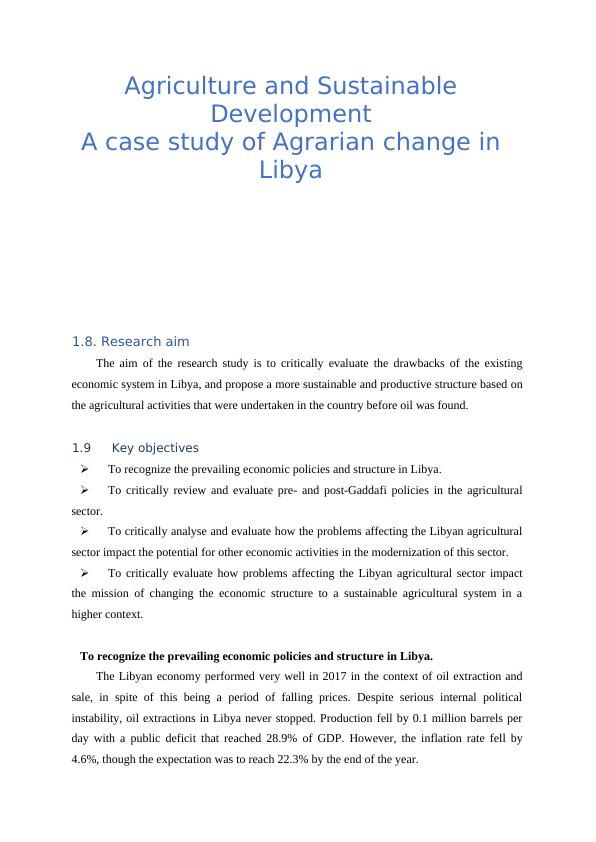
To critically review and evaluate pre- and post-Gaddafi policies in the agricultural
sector.
According to Charles Harvie (2020), Libya experienced traumatic economic
consequences due to a long civil war that lead to destroying part of the infrastructure of the
country, halting oil production. The legacy of Muammar Gaddafi’s rule left the country with
the costs of reconstruction. The increased oil revenue may also produce different
consequences on the basis of the non-oil trade balance.
As per the linkage between the research questions and the overall literature review, it
has been found that in earlier times, the economic structure of Libya performed well.
However, in the current situation, the economic data is insufficient given its two main
political factions, security threats, oil production problems, and low global oil prices.
1.10 Research questions
What are the pre and post Gaddafi policies in the agricultural sector?
How do problems affecting the Libyan agricultural sector impact the country as it
enters into alternative economic activities, such as capital intensive agriculture production,
including olive farming?
What are the other model countries with similar social, cultural, and weather
conditions and what are their economic conditions?
How do problems affecting the Libyan agricultural sector impact the mission of
changing the economic structure in Libya?
What benefit does diversification provide for long term development methods that
allow a country to avoid economic decline and reap a sustainable boom?
sector.
According to Charles Harvie (2020), Libya experienced traumatic economic
consequences due to a long civil war that lead to destroying part of the infrastructure of the
country, halting oil production. The legacy of Muammar Gaddafi’s rule left the country with
the costs of reconstruction. The increased oil revenue may also produce different
consequences on the basis of the non-oil trade balance.
As per the linkage between the research questions and the overall literature review, it
has been found that in earlier times, the economic structure of Libya performed well.
However, in the current situation, the economic data is insufficient given its two main
political factions, security threats, oil production problems, and low global oil prices.
1.10 Research questions
What are the pre and post Gaddafi policies in the agricultural sector?
How do problems affecting the Libyan agricultural sector impact the country as it
enters into alternative economic activities, such as capital intensive agriculture production,
including olive farming?
What are the other model countries with similar social, cultural, and weather
conditions and what are their economic conditions?
How do problems affecting the Libyan agricultural sector impact the mission of
changing the economic structure in Libya?
What benefit does diversification provide for long term development methods that
allow a country to avoid economic decline and reap a sustainable boom?
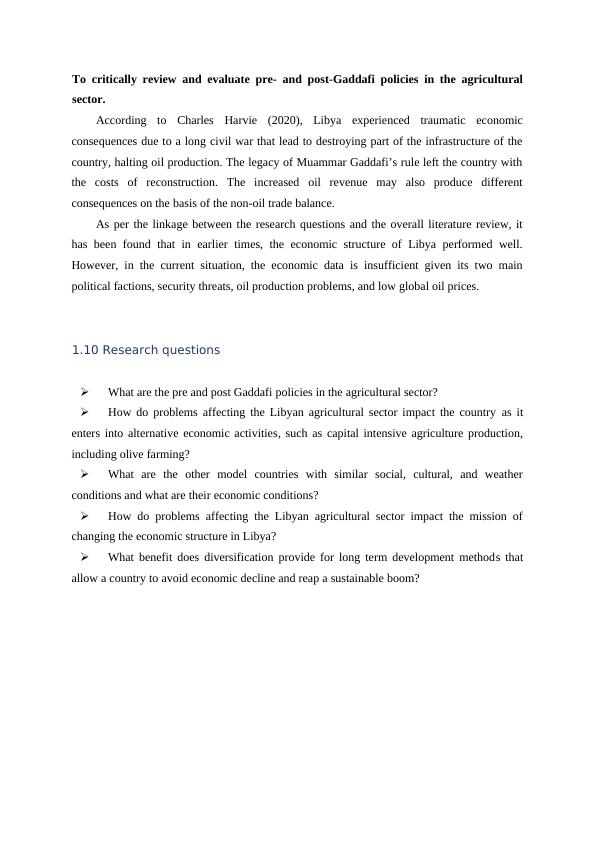
Chapter 2
2.0 Literature Review
This section forms one of the most vital parts of any dissertation and research project, by
facilitating a systematic analysis of secondary forms of data, with a view to establish a better
understanding about a set specific topic. The current dissertation is based on the topic of
agriculture and sustainable development and the research aim of the current dissertation is to
evaluate the main issues related with agriculture development in accordance and relation with
government policy within an emerging economy.
The literature review comprises an effective analysis and discussion about the role of
agriculture in the overall national development, along with an analysis of its effect on poverty
reduction and the economic development of a nation. The present chapter also includes a
review of the literature based on new perspectives stemming from the role of agriculture,
along with a focus and emphasis on small farmers. Moreover, the chapter shall also provide a
discussion on effective rural development and the role of government policies in
strengthening agricultural development. Further, an examination of the relationship between
the agricultural policy and rural development policy is also conducted. Finally, a discussion
and analysis of agricultural policies and related governance is also provided, along with an
analysis of the importance of education, empowerment and engagement in agriculture
policymaking, together with review of Dutch disease issues of economic development.
The literature review is designed to keep in view the context of Libya, while focusing
and emphasising on enhancing our overall understanding of the topic regarding the impact of
changing agricultural policies, along with details surrounding approaches within the
agricultural sector performance in the context of Libya. By way of introduction, the view is
taken that agriculture is a human undertaking that primarily deals with the production of food
and animals, along with the provision of raw materials for industries to ensure the smooth
production of goods and services, with a view to effectively satisfy the needs and wants of
humankind. Further, the development of agriculture within a country mainly depends in the
2.0 Literature Review
This section forms one of the most vital parts of any dissertation and research project, by
facilitating a systematic analysis of secondary forms of data, with a view to establish a better
understanding about a set specific topic. The current dissertation is based on the topic of
agriculture and sustainable development and the research aim of the current dissertation is to
evaluate the main issues related with agriculture development in accordance and relation with
government policy within an emerging economy.
The literature review comprises an effective analysis and discussion about the role of
agriculture in the overall national development, along with an analysis of its effect on poverty
reduction and the economic development of a nation. The present chapter also includes a
review of the literature based on new perspectives stemming from the role of agriculture,
along with a focus and emphasis on small farmers. Moreover, the chapter shall also provide a
discussion on effective rural development and the role of government policies in
strengthening agricultural development. Further, an examination of the relationship between
the agricultural policy and rural development policy is also conducted. Finally, a discussion
and analysis of agricultural policies and related governance is also provided, along with an
analysis of the importance of education, empowerment and engagement in agriculture
policymaking, together with review of Dutch disease issues of economic development.
The literature review is designed to keep in view the context of Libya, while focusing
and emphasising on enhancing our overall understanding of the topic regarding the impact of
changing agricultural policies, along with details surrounding approaches within the
agricultural sector performance in the context of Libya. By way of introduction, the view is
taken that agriculture is a human undertaking that primarily deals with the production of food
and animals, along with the provision of raw materials for industries to ensure the smooth
production of goods and services, with a view to effectively satisfy the needs and wants of
humankind. Further, the development of agriculture within a country mainly depends in the
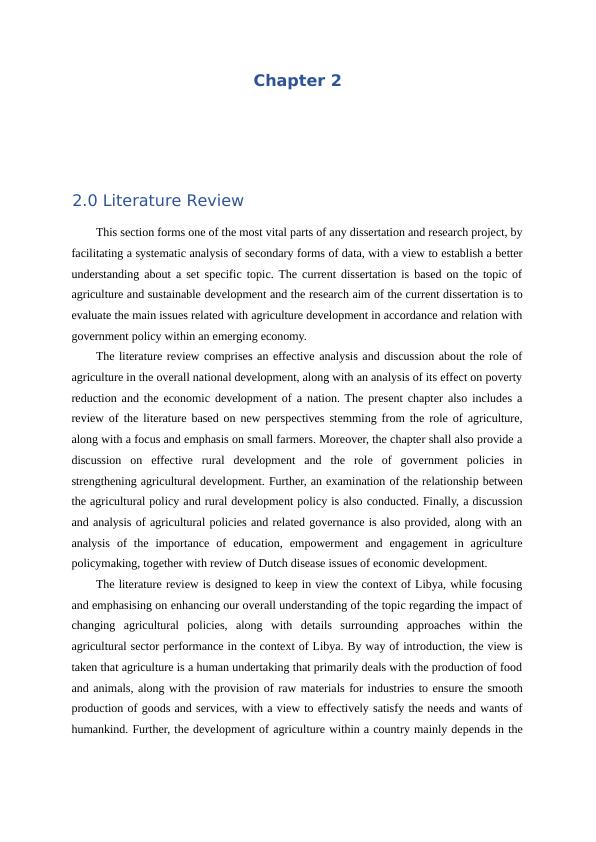
effectiveness of the agricultural policies that are adopted, which largely depend on the
priorities and particular needs of that specific country.
For instance, in some cases, the concept of industrialisation competes with agriculture,
while in others it runs parallel. Thus, issues related to the development of agriculture at the
cost of industrial development have been a matter of controversy and it is a debatable concept
for both economists and researchers. A literature review can be defined as a method of
critically collecting information on a specific topic or research questions in order to obtain
reliable answers that help a researcher present valid conclusions. In this literature review, the
sources are collected from published books, journals, articles, and other scholarly sources.
The researcher used these to effectively gather, analyse and collect information on the
agricultural development of Libya (Udaykumar, 2015).
As per the view point of Priyadarshini, P. and Abhilash, P.C., 2020, the development of
industries is more important than focusing and emphasising on agricultural development in
the countries like Libya that are rich in oil resources. Thus, the role of agriculture in
economic development and its contribution to GDP is highly questionable.
2.1 The role of agriculture in facilitating better development
Saravanakumar, V., Malaiarasan, U. and Balasubramanian, R. (2020) put forward the notion
that agriculture is a concept that is considered differently by different people. From the view
point of a farmer, agriculture can be defined as regular and everyday practices that fulfil their
family’s needs, given that agriculture acts as a means of earnings for them. From the
perspective of an economist, agriculture can be considered an important sector of the
economy that contributes towards better economic development through contributing to a rise
in GDP (gross domestic product). Further, according to the view point of Griesche, C. and
Baeumner, A.J., 2020, agriculture is a complex term which comprises many vital activities
and a set of actions; it can be defined as a science or farming practice that involves the
cultivation of soil for the purpose of growing crops. Libiya is situated in the North Africa and
it comprises of three historical regions that is Tripolitania, Cyrenaica and Fezzan. According
to Ronald Bruce St John, in the year of 1999 Libiya introduced the socio-economic reforms
which are targeted to liberalise the economy. Also, Libiya resolved the dispute of the
Lockerbie and then it renounced the unconventional weapons. That is why the progress was
priorities and particular needs of that specific country.
For instance, in some cases, the concept of industrialisation competes with agriculture,
while in others it runs parallel. Thus, issues related to the development of agriculture at the
cost of industrial development have been a matter of controversy and it is a debatable concept
for both economists and researchers. A literature review can be defined as a method of
critically collecting information on a specific topic or research questions in order to obtain
reliable answers that help a researcher present valid conclusions. In this literature review, the
sources are collected from published books, journals, articles, and other scholarly sources.
The researcher used these to effectively gather, analyse and collect information on the
agricultural development of Libya (Udaykumar, 2015).
As per the view point of Priyadarshini, P. and Abhilash, P.C., 2020, the development of
industries is more important than focusing and emphasising on agricultural development in
the countries like Libya that are rich in oil resources. Thus, the role of agriculture in
economic development and its contribution to GDP is highly questionable.
2.1 The role of agriculture in facilitating better development
Saravanakumar, V., Malaiarasan, U. and Balasubramanian, R. (2020) put forward the notion
that agriculture is a concept that is considered differently by different people. From the view
point of a farmer, agriculture can be defined as regular and everyday practices that fulfil their
family’s needs, given that agriculture acts as a means of earnings for them. From the
perspective of an economist, agriculture can be considered an important sector of the
economy that contributes towards better economic development through contributing to a rise
in GDP (gross domestic product). Further, according to the view point of Griesche, C. and
Baeumner, A.J., 2020, agriculture is a complex term which comprises many vital activities
and a set of actions; it can be defined as a science or farming practice that involves the
cultivation of soil for the purpose of growing crops. Libiya is situated in the North Africa and
it comprises of three historical regions that is Tripolitania, Cyrenaica and Fezzan. According
to Ronald Bruce St John, in the year of 1999 Libiya introduced the socio-economic reforms
which are targeted to liberalise the economy. Also, Libiya resolved the dispute of the
Lockerbie and then it renounced the unconventional weapons. That is why the progress was
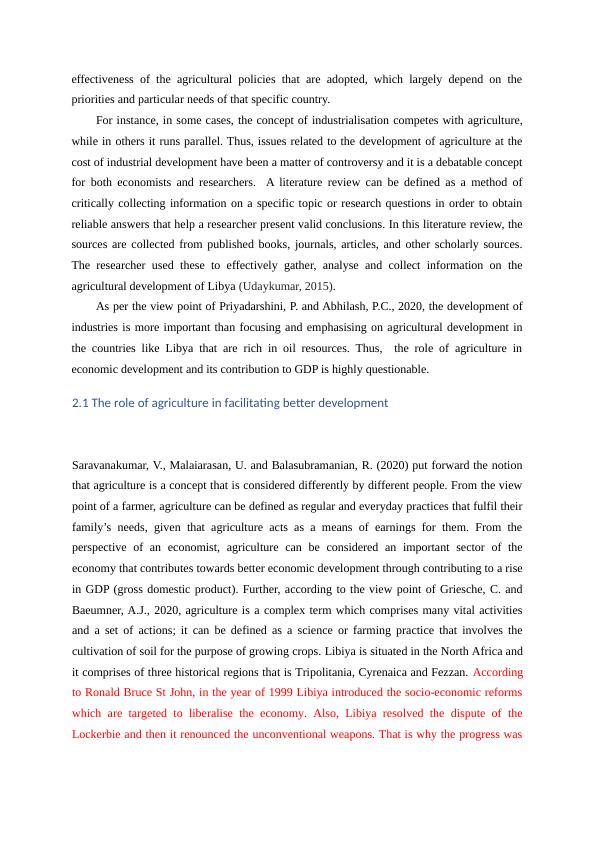
made in the following years however it required major improvements in the initiatives in
other economic sectors (The Changing Libyan Economy: Causes and Consequences).
Beside this, the rearing of animals by the way of providing food for the production of
wool and other natural products also forms a vital part of agriculture. Moreover, the
development of agriculture has been directed by many crucial influencing factors, such as the
level of labour productivity along with improvements in land productivity and other
environmental and economic factors. Further, the development of agriculture also varies
according to many other contexts and circumstances associated with this sector that influence
its development level in the economy. In the early years of the 1960s, a significant level of
development was observed in the agriculture sector, particularly during the early signs of
industrialisation. The main reason and cause for the development of agriculture during these
times of industrialisation was based on the fact that a high demand of raw material and other
subsidiary products was created by industries that place more emphasis and pressure on the
effective development of agriculture. It has also been also observed that traditional forms of
agriculture could be transformed and rapidly converted into more modern types by way of
effective adoption of current science-based technology, along with improved agriculture
approaches, which would in turn increase productivity levels. Thus, improvements and
developments in the agriculture sector that comprise the use of improved technology and the
scientific approach would contribute to improved national growth.
Moreover, agriculture plays a crucial role in the economy and in ensuring the
development of countries, as it provides the main source of food, income and employment to
rural populations and supports the development and operations of factories in cities. Further,
improvements in agriculture and land-use are fundamental to achieving food security, poverty
alleviation and overall sustainable development within a country. Economists have observed a
stronger link between multiplier effects and growth of agriculture, in comparison to the non-
agriculture sector. Meanwhile, some economists favour the notion that agriculture plays a
vital role in the overall development of a nation by effectively contributing to GDP and other
growth factors. As per Mohsin Khan and Karim Mezran, the economy of Libiya has affected
during february 2011 which has led to bring down the Muammar Qaddafi regime. Due to the
war, all economic activities have declined and some recovery was seen in the year of 2012.
The next years were far better and optimistic then the previous one (The Libyan Economy
after the Revolution).
In the process of facilitating improved development, it is essential to understand the
agricultural sector, in which farming is the core aspect representing the true fabric of rural
other economic sectors (The Changing Libyan Economy: Causes and Consequences).
Beside this, the rearing of animals by the way of providing food for the production of
wool and other natural products also forms a vital part of agriculture. Moreover, the
development of agriculture has been directed by many crucial influencing factors, such as the
level of labour productivity along with improvements in land productivity and other
environmental and economic factors. Further, the development of agriculture also varies
according to many other contexts and circumstances associated with this sector that influence
its development level in the economy. In the early years of the 1960s, a significant level of
development was observed in the agriculture sector, particularly during the early signs of
industrialisation. The main reason and cause for the development of agriculture during these
times of industrialisation was based on the fact that a high demand of raw material and other
subsidiary products was created by industries that place more emphasis and pressure on the
effective development of agriculture. It has also been also observed that traditional forms of
agriculture could be transformed and rapidly converted into more modern types by way of
effective adoption of current science-based technology, along with improved agriculture
approaches, which would in turn increase productivity levels. Thus, improvements and
developments in the agriculture sector that comprise the use of improved technology and the
scientific approach would contribute to improved national growth.
Moreover, agriculture plays a crucial role in the economy and in ensuring the
development of countries, as it provides the main source of food, income and employment to
rural populations and supports the development and operations of factories in cities. Further,
improvements in agriculture and land-use are fundamental to achieving food security, poverty
alleviation and overall sustainable development within a country. Economists have observed a
stronger link between multiplier effects and growth of agriculture, in comparison to the non-
agriculture sector. Meanwhile, some economists favour the notion that agriculture plays a
vital role in the overall development of a nation by effectively contributing to GDP and other
growth factors. As per Mohsin Khan and Karim Mezran, the economy of Libiya has affected
during february 2011 which has led to bring down the Muammar Qaddafi regime. Due to the
war, all economic activities have declined and some recovery was seen in the year of 2012.
The next years were far better and optimistic then the previous one (The Libyan Economy
after the Revolution).
In the process of facilitating improved development, it is essential to understand the
agricultural sector, in which farming is the core aspect representing the true fabric of rural
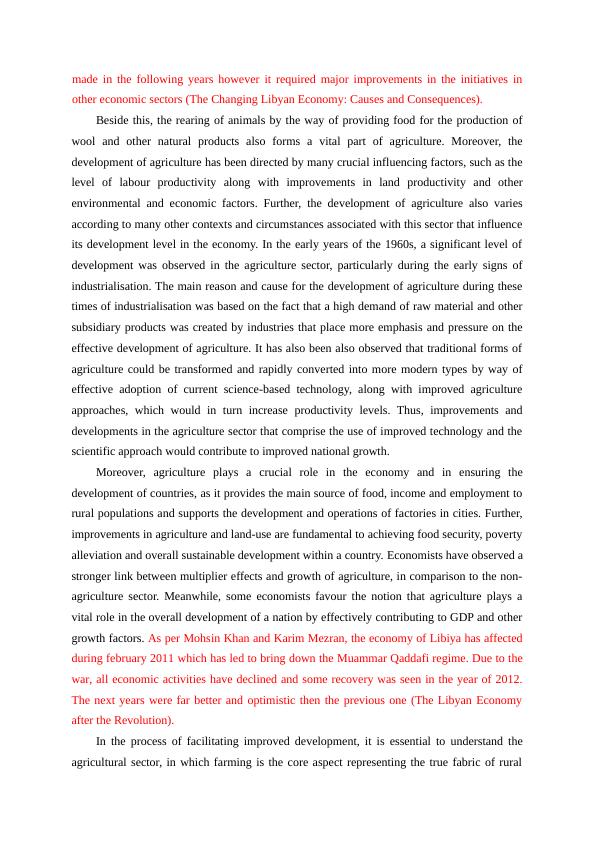
society in many countries around the world. Any sudden changes within the agriculture sector
highly impacts the farming sector, given economically developing countries face severe
consequences in terms of both political and social stability (Demidenko et. al., 2019). In the
process of improving the economic growth of developing countries, agriculture plays a
crucial role within rural development, especially in terms of land-use, where the sector is of
less economical importance. The most important potential contributions of farming within the
agriculture sector with respect to rural development include supporting job opportunities,
environmental services, and ancillary businesses.
In terms of peripheral regions or areas, farming is considered essential within the
agricultural field, because it supports both the social and economic infrastructure. Policies
related to rural development are thus exploiting the contribution of farming, which reflects
the improvement of farm activities and supports ancillary services, which in turn helps
improve the sustainable development of rural areas and regions.
2.2 The role of agriculture in facilitating better development
With regards to the development of agriculture within society, there are several related
factors that may be used and managed, such as agricultural conditions, geographic location
and natural resources. It is useful to bear these factors in mind when determining the
agricultural conditions of different countries, such as Uganda, Zambia, Ghana and Ethiopia.
Barrett et al. (2021) identified various interrelated factors that can be used to determine the
role of agriculture in developed countries such as the UK, USA, and countries in Europe in
light of the globalization process. These factors include the value chain, rapidly developing
technologies, institutional development, innovation, along with environmental development
and any associated changes. It is recognised that these factors are effective in improving
economic development. Various important aspects can be identified that are not essential in
the development of social transformation and are thus considered central objectives in the
development of rural sectors.
On the other hand, Hochberg (2021) identified that the Nigerian government introduced
a different set of policies which facilitated them in working to ensure the continued role of the
agricultural sector. This was done in the absence of a different set of agricultural policies
related to the activation of the agricultural sector. Inadequate funds and improper
implementation of policies are among the main reasons why agricultural countries enlist new
policies and enact social economic reforms. These factors have played a significant role in
influencing the adjustment of policies in the Chinese economy and its economic
highly impacts the farming sector, given economically developing countries face severe
consequences in terms of both political and social stability (Demidenko et. al., 2019). In the
process of improving the economic growth of developing countries, agriculture plays a
crucial role within rural development, especially in terms of land-use, where the sector is of
less economical importance. The most important potential contributions of farming within the
agriculture sector with respect to rural development include supporting job opportunities,
environmental services, and ancillary businesses.
In terms of peripheral regions or areas, farming is considered essential within the
agricultural field, because it supports both the social and economic infrastructure. Policies
related to rural development are thus exploiting the contribution of farming, which reflects
the improvement of farm activities and supports ancillary services, which in turn helps
improve the sustainable development of rural areas and regions.
2.2 The role of agriculture in facilitating better development
With regards to the development of agriculture within society, there are several related
factors that may be used and managed, such as agricultural conditions, geographic location
and natural resources. It is useful to bear these factors in mind when determining the
agricultural conditions of different countries, such as Uganda, Zambia, Ghana and Ethiopia.
Barrett et al. (2021) identified various interrelated factors that can be used to determine the
role of agriculture in developed countries such as the UK, USA, and countries in Europe in
light of the globalization process. These factors include the value chain, rapidly developing
technologies, institutional development, innovation, along with environmental development
and any associated changes. It is recognised that these factors are effective in improving
economic development. Various important aspects can be identified that are not essential in
the development of social transformation and are thus considered central objectives in the
development of rural sectors.
On the other hand, Hochberg (2021) identified that the Nigerian government introduced
a different set of policies which facilitated them in working to ensure the continued role of the
agricultural sector. This was done in the absence of a different set of agricultural policies
related to the activation of the agricultural sector. Inadequate funds and improper
implementation of policies are among the main reasons why agricultural countries enlist new
policies and enact social economic reforms. These factors have played a significant role in
influencing the adjustment of policies in the Chinese economy and its economic
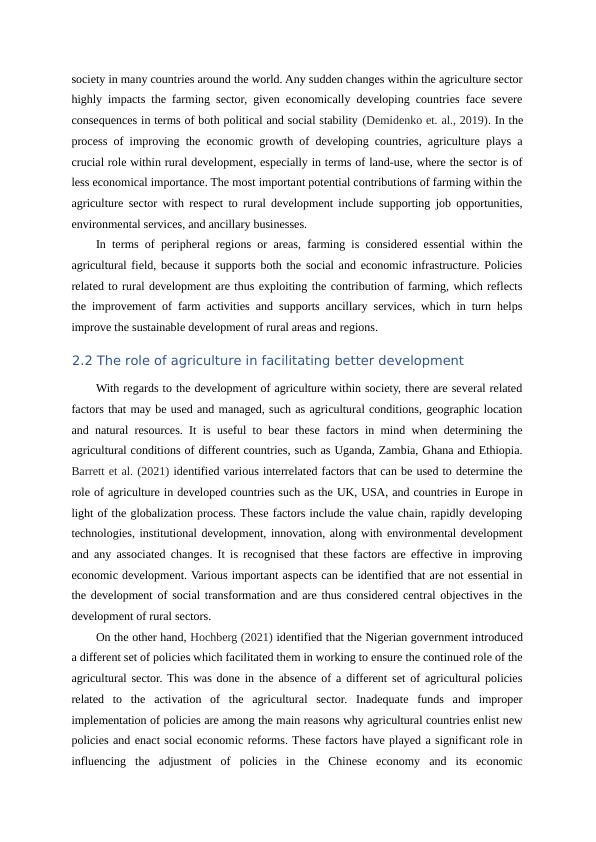
development. Moreover, it could be said improved economic development influences non-
agricultural development, including the industrial sectors. There are many sectors in the
Chinese economy where policy adjustments make economic and structural changes to its
economy.
Linke and Ruether (2021) suggest that productivity in agricultural labour and land works
through the application of subsidies and support, and that this is particularly effective in the
agricultural sectors of many Asian countries. All of these policies are essential for the
successful growth in development of agricultural sectors and have a significant influence on
society. Sustainable development in agriculture is essentially related to farming and effective
sustainable development. All of the above factors are thus related to a society's food security,
the textile industry and contribute towards future generations and their daily basic needs. As
per Siddiqui (2021), land reforms in South Africa were not effective policies given they were
dependent on rural inequality. For instance, land reform measures have been used in Libya,
where changes are made in big urban-based absentees for land owners. According to Hussein
Solomon and Gerrie Swart, the policy of Libiya it has stated the two influential school of
thoughts. Under the first approach, the physiological determinants of the Colonel Muammar
Gaddari's features and personality. Due to his military adventurism, he was given the title of
the 'rogue criminal' (Libiya's Foreign Policy in Flux).
Agriculture is a facet of the overarching environmental structure and plays a significant
role in climate change, water scarcity, different types of land degradation, deforestation,
among other changes related to various other processes. This factor is related to agricultural
and sustainable development, which contributes towards the growing population within the
changing environment of a country and its various environmental conditions. This in fact a
debatable position in the overall analysis of the sustainability development of agriculture.
There are many ethical considerations relating to agriculture, and for moral obligations to
work it is important to pursue sustainability approaches. As stated by Ali Mohammed El-
Sseid and et.al.,Gaddari created the ideology on the basis of the Popular Revolution and
under this theory Gaddari praised the nationalism as a progressive force. Under which he
dominated the politics for about four decades (A Pre and post-Muammar Al Gaddafi era and
new historicism).
2.3 Agricultural and economic development
Across the world, the share of economic growth and contribution technological
management which are related to about 32% of the population are employed through major
agricultural development, including the industrial sectors. There are many sectors in the
Chinese economy where policy adjustments make economic and structural changes to its
economy.
Linke and Ruether (2021) suggest that productivity in agricultural labour and land works
through the application of subsidies and support, and that this is particularly effective in the
agricultural sectors of many Asian countries. All of these policies are essential for the
successful growth in development of agricultural sectors and have a significant influence on
society. Sustainable development in agriculture is essentially related to farming and effective
sustainable development. All of the above factors are thus related to a society's food security,
the textile industry and contribute towards future generations and their daily basic needs. As
per Siddiqui (2021), land reforms in South Africa were not effective policies given they were
dependent on rural inequality. For instance, land reform measures have been used in Libya,
where changes are made in big urban-based absentees for land owners. According to Hussein
Solomon and Gerrie Swart, the policy of Libiya it has stated the two influential school of
thoughts. Under the first approach, the physiological determinants of the Colonel Muammar
Gaddari's features and personality. Due to his military adventurism, he was given the title of
the 'rogue criminal' (Libiya's Foreign Policy in Flux).
Agriculture is a facet of the overarching environmental structure and plays a significant
role in climate change, water scarcity, different types of land degradation, deforestation,
among other changes related to various other processes. This factor is related to agricultural
and sustainable development, which contributes towards the growing population within the
changing environment of a country and its various environmental conditions. This in fact a
debatable position in the overall analysis of the sustainability development of agriculture.
There are many ethical considerations relating to agriculture, and for moral obligations to
work it is important to pursue sustainability approaches. As stated by Ali Mohammed El-
Sseid and et.al.,Gaddari created the ideology on the basis of the Popular Revolution and
under this theory Gaddari praised the nationalism as a progressive force. Under which he
dominated the politics for about four decades (A Pre and post-Muammar Al Gaddafi era and
new historicism).
2.3 Agricultural and economic development
Across the world, the share of economic growth and contribution technological
management which are related to about 32% of the population are employed through major
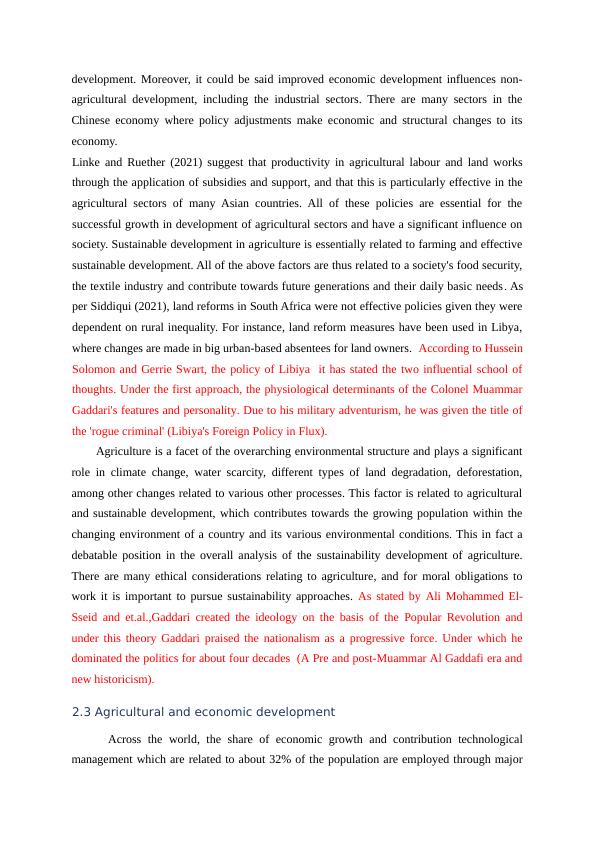
population and their valuable resourceful task which are related to the different challenges
and practical approaches which are used and manage as per the basic integrity and definite
solution. This affects the growth of GDP when analysing economic development. According
to Shuaibu and Nchake (2021), the physical and economic climates differ between countries,
and there is limited data on countries suffering from a lack of natural resources, sporadic/slow
rainfall and having a fresh water supply chain. The economy of each country is related to its
growth and its dependence on agriculture. Most people experience threats of food insecurity
and do not live in areas of sustainability and agricultural industry (Agriculture and Economic
Development, 2021).
Those in Libya during crisis have experienced food scarcity, which forced them to forgo
work and seek necessities, with limited access to medical facilities. Which are related to
development for the important to mention with the line of correspondent to international
standard industrial classification. Which are related to 1-5 division and represent forestry,
hunting and fishery, cultivation of crops and livestock production. Agoubi (2021) states that
the productivity of cereal has been increasing in Libya, where resources related to economic
growth are managed. Farmers and ranchers rely on purchasing equipment and funding for
maintenance in order to be productive. There are a number of difference sectors that are
related to crop protection products, research and large development processes for managing
high standards and ensuring growth in the financial services and transportation sectors.
Grynberg and Singogo (2021) suggest that the agricultural sector must be successful since it
is important to avoid any decline in the overall economy of a country. Growth in the
agricultural sector will cause the oil sector to become more successful. All of the above are
related to the growth and advantages of a country and the various sectors of its economy. As
said by Anna Sheps, Libya comprises of the Sahara desert that is why it has dry climate, there
is also lack of natural resources, limited supply of water and low rainfall. It can be said that
the a healthy agriculture can not be possible with above mentioned factors. That is why the
country is getting major part of income from the oil industry. Also, the Libyan crisis led to
force the emigration of many laborers in the country. Due to which agricultural production
dropped and resulted in a major increase in food imports. Hence, the residents who have
remained in Libya during the crisis are experiencing life in the desert, forcing them to waive
the necessities that is medical care in order to pay for food (THE CHALLENGES OF
SUSTAINABLE AGRICULTURE IN LIBYA).
Further, other nations such as Saudi Arabia, Libya, and Kuwait have been working on
their dependence on oil exports and imports in order to support their GDP and their basic
and practical approaches which are used and manage as per the basic integrity and definite
solution. This affects the growth of GDP when analysing economic development. According
to Shuaibu and Nchake (2021), the physical and economic climates differ between countries,
and there is limited data on countries suffering from a lack of natural resources, sporadic/slow
rainfall and having a fresh water supply chain. The economy of each country is related to its
growth and its dependence on agriculture. Most people experience threats of food insecurity
and do not live in areas of sustainability and agricultural industry (Agriculture and Economic
Development, 2021).
Those in Libya during crisis have experienced food scarcity, which forced them to forgo
work and seek necessities, with limited access to medical facilities. Which are related to
development for the important to mention with the line of correspondent to international
standard industrial classification. Which are related to 1-5 division and represent forestry,
hunting and fishery, cultivation of crops and livestock production. Agoubi (2021) states that
the productivity of cereal has been increasing in Libya, where resources related to economic
growth are managed. Farmers and ranchers rely on purchasing equipment and funding for
maintenance in order to be productive. There are a number of difference sectors that are
related to crop protection products, research and large development processes for managing
high standards and ensuring growth in the financial services and transportation sectors.
Grynberg and Singogo (2021) suggest that the agricultural sector must be successful since it
is important to avoid any decline in the overall economy of a country. Growth in the
agricultural sector will cause the oil sector to become more successful. All of the above are
related to the growth and advantages of a country and the various sectors of its economy. As
said by Anna Sheps, Libya comprises of the Sahara desert that is why it has dry climate, there
is also lack of natural resources, limited supply of water and low rainfall. It can be said that
the a healthy agriculture can not be possible with above mentioned factors. That is why the
country is getting major part of income from the oil industry. Also, the Libyan crisis led to
force the emigration of many laborers in the country. Due to which agricultural production
dropped and resulted in a major increase in food imports. Hence, the residents who have
remained in Libya during the crisis are experiencing life in the desert, forcing them to waive
the necessities that is medical care in order to pay for food (THE CHALLENGES OF
SUSTAINABLE AGRICULTURE IN LIBYA).
Further, other nations such as Saudi Arabia, Libya, and Kuwait have been working on
their dependence on oil exports and imports in order to support their GDP and their basic
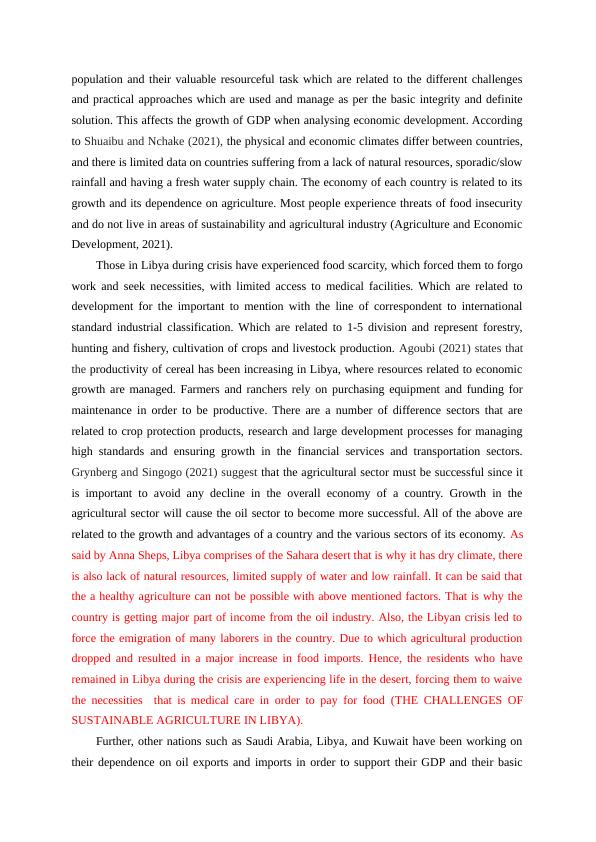
End of preview
Want to access all the pages? Upload your documents or become a member.
Related Documents
Agriculture and Sustainable Development: A Case Study of Agrarian Change in Libyalg...
|10
|881
|441
Agriculture and Sustainable Development: A Case Study of Agrarian Change in Libyalg...
|42
|13996
|477
Agriculture and Sustainable Development: A Case Study of Agrarian Change in Libyalg...
|18
|6640
|1
Agriculture and Sustainable Development: A Case Study of Agrarian Change in Libyalg...
|41
|18193
|26
Agriculture and Sustainable Development: A Case Study of Agrarian Change in Libyalg...
|44
|18493
|49
How Drought Affected the Australian Agricultural Industrylg...
|21
|3914
|119